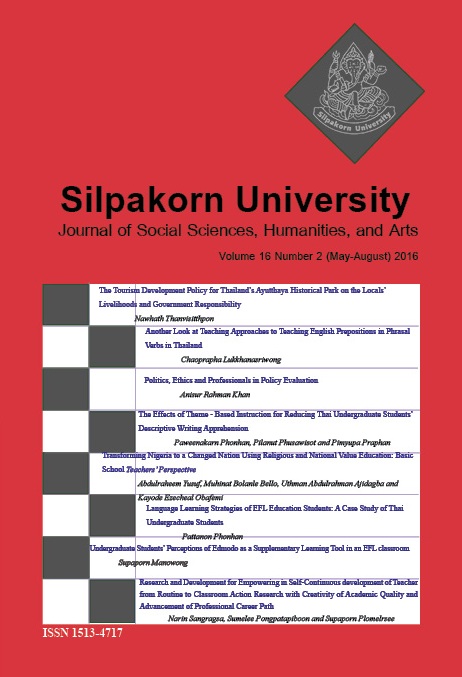Transforming Nigeria to a Changed Nation Using Religious and National Value Education: Basic School Teachers’ Perspective
Main Article Content
Abstract
The purpose of the study was to examine the perception of Basic school teachers of using religious and national values to transform Nigeria to a changed nation. 421 Religious and national values teachers (handling Islamic studies, Christian Religious Studies, Social Studies, Civic Education, and Security Education) comprising of 190 males and 231 females in 341 selected Basic schools in Kwara State participated in the study.Researcher- designed questionnaire was used to collect data that were analysed using descriptive statistics, t-test and Analysis of Variance (ANOVA). The result showed that Religious and National Values can be used to transform Nigeria into a positively changed nation. It was also unfolded that teachers’ perception was significantly influenced by gender, school type, qualification, and experience. Based on the findings, it was suggested among others that Religious and National Values should be taught and handled by qualified teachers so as to inculcate in the students the needed moral values, attitude and knowledge to become good citizenry that will appreciate and promote the transformation of Nigeria to a changed nation.
Downloads
Article Details
All rights reserved. Apart from citations for the purposes of research, private study, or criticism and review,no part of this publication may be reproduced, stored or transmitted in any other form without prior written permission by the publisher.
References
Akubuilo, F. (2012) Holistic Assessment of Student’s Learning Outcome. Journal of Education and Practice 3(12): 56-60.
Bates, R. H. (1987) The Politics of Agricultural Pricing in Sub-Saharan Africa. In African State in Transition, edited by Essam Zaki pp. 23-38. New York: St. Martin’s Press.
Briggs, T. H. (1930) The Great Investment: A Secondary Education in a Democracy. Harvard University Press.
Cheng, S. L. (2007) The Impact of Educational Qualification on trends in Leisure Activities. [Online URL: www.restore.ac.uk/UPTAP] accessed on May 15, 2015.
Dania, P. O. and Emuebie, J. E. (2012) Social Studies Education in the 21st Century: A Tool for Fighting Corruptionin Nigeria. African Research Review 6(2): 181-191
Dike, V. (1999) The Philosophy of Transforming Nigeria into a Corruption-free Society: are the Probes the Solution? [Online URL: www.nigeriaworld.com/feature/article/corruption.html] accessed on May 17, 2015.
Enu, D. B. (2007) Selecte Issues in Global Education. Calabar: Siesty Media
Federal Republic of Nigeria (2011) National Policy on Education. Abuja: NERDC
Federal Republic of Nigeria (2013) National Policy on Education. Abuja: NERDC
Igwebuike, T. B. and Oghenesuvwe, M. O. (2013) Influence of Qualification of Secondary School Science eachers on their Perception of Self-efficacy. Journal of Education and Practice 4(15): 23-29.
Junaid, I. O. (2015) Teachers and Students’ Perceptions of the Adequacy of Upper Basic Social Studies Curriculum as a Tool for Citizenship Participation and National Security in Nigeria. Being a paper presented at the 2015 Faculty of Education, University of Ibadan National Conference.
Kulinna, P. H., Cothran, D. J. and Zhu, W. (2000) Teachers’ Experience with and Perceptions of Mosston’s Spectrum: How Do They Compare with Students? [Online URL: www.spectrumofteachingstyles.org/library-resources-k.php] accessed on May 17, 2015.
Jekayinfa, A. A. (1996) Teachers’ Perception of Social Studies Education in the Nigerian Secondary Schools. Journal of Sociology of Education 3(8): 103-109.
Mezieobi, K. A. (1994) Achieving National Development via the Instrumentality of Distant Education in Social Studies: Myth or Reality? Journal for Distance Education 2(1): 113-121
Mezieobi, K. A. (2010) The Place of Social Studies Education in National Development in Nigeria. In Social Studies and Integrated National Development in Nigeria, edited by Emman Osakwe, pp. 19-24. Ibadan: Kraft Books limited.
Mezieobi K. A. (2012) Bulldozing Corruption Impeding Nigeria’s National Transformation via the Instrumentality of Social Studies Education. A lead paper presented at the 29th National conference of the social studies association of Nigeria held in Benue State University, Makurdi, Benue state, Nigeria
Nairu, S. (2011) Nigeria: The Challenges of National Transformation. [Online URL: www.ijern.com/journal/February-2014/33.pdf] accessed on May 18, 2015.
Nigerian Educational Research and Development Council (2012) Religion and National Values for Primaries 4-6. Abuja: NERDC.
Nwaubani, O. O. (2010) Refocusing Junior Secondary School Social Studies Curriculum for Effective Promotion of Peace Education in Nigeria. Nigerian Journal of Curriculum Studies 17(2): 55-68.
Obanya, P. A. I. (2002) Revitalizing Education in Africa. Ibadan: Sterling Horden Publishers (Nig) Ltd.
Obasanjo, O. (1999, October, 1) Moral Foundations for our Polity. Being National Broadcast to the Nation on he 39th Anniversary of Nigeria Independence, October 1, 1999, as reported by the Guardian 1 1999.
Odumuyiwa, E. A. (2002) Nigeria as a Religious but Criminal Society. Being an Inaugural Lecture Presented at Olabisi Onabanjo University
Okobiah, O. S. (1985) The New National Policy on Education and Development of Social Studies Curriculum for the Nigerian Schools. Nigerian Journal of Curriculum Studies 2(2): 23-29
Olawepo, J. A. (1984) Teachers’ Perceptions of Social Studies Orienta-tions at the Primary School Level. Unpublished Ph.D thesis, University of Ibadan.
Opoh, F. A. (2011) Pedagogical Variables and Academic Achievement in Social Studies among Secondary School Students in Cross River States, Nigeria. Unpublished M. Ed thesis, Faculty of Education, University of Calabar.
Orimoloye, P. A. (1983) Social Studies Educators’ Perspectives on Citizenship Education in Primary and Secondary Schools, in Oyo State. Unpublished Ph.D. Thesis, Michigan State University.
Osakwe, E. O. (2012) Social Studies and Politics in Nigeria: Some Developmental Consensus. In Social Studies and Integrated National Developmen in Nigeria, edited by Emman Osakwe, Ibadan: Kraft books limited.
Oyekan, S. O. (2000) Foundations of Teacher Education. Ibadan: Ben Quality prints.
Orji, K. E. and Maekae, J. (2013) The Role of Education in National Development: Nigerian Experience. European Scientific Journal9 (28): 312 – 320.
Pedus, A. (2008) The Role of Nigeria Youth in National Transformation. [Online URL: https://www.tigweb.org/youth-media/panorama/article.html?ContentID=17833] accessed on May 12, 2015.
Sans, B. N. (2001) Decentralizing an Economy, the Role of BureauCorruption in China Economic Reform. Public choice 65(1): 85-91
Transparency international (2009) Corruption perception index. Retrieved from: www:transparency.org.
Xhevahire, K. and Edmond, R. (2014) Teachers’ Work Experience: Perception and Attitude toward Reading and Writing for Critical Thinking. Journal of Educational and Social Research 4(6): 121-124.


